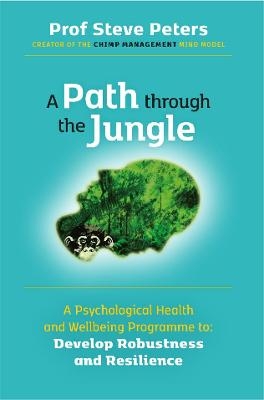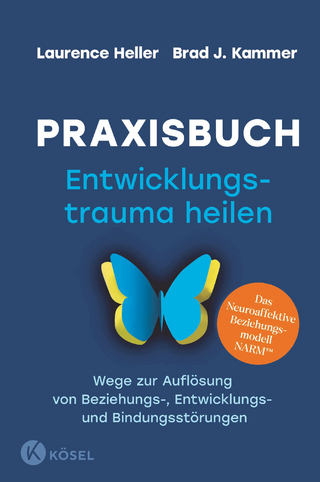
A Path through the Jungle
Mindfield Media (Verlag)
978-1-9989911-0-5 (ISBN)
I read it in 2 days and it's now in my top 3 most valued books EVER – STEVEN BARTLETT:DIARY OF A CEO HOST & Dragons Den
"20+ years in professional football, you get to meet some incredible people!! I was lucky enough to spend time with Prof Peters with England. If you've not read 'A Path through the Jungle' I'd highly recommend it!" BEN FOSTER: EX ENGLAND GOALKEEPER
Ever wanted to succeed but not sacrifice your health, relationships and values to get there? This is possibly the most important book you will ever read!!! Professor Michael Coleman, Professor of Neuroscience, University of Cambridge
Professor Steve Peters is a Consultant Psychiatrist and author of the bestselling self-help book, The Chimp Paradox. He has years of experience as a clinician, an educator and has worked with some of the world’s most successful athletes.
His new book 'Path through the Jungle' will help you to become robust and resilient. Professor Peters explains complex neuroscience in straightforward terms with his Chimp Management Mind Model.
Robust: Becoming robust means having plans in place to manage your own mind and whatever situations you meet in life.
Resilient: is being able to bounce back and manage the challenges of life. Resilience is a skill.
A Path through the Jungle offers a structured programme with exercises and practical real-life examples. This book will help you to improve in areas such as:
Managing stress and anxiety
Improved relationships
Emotional management
Grief and loss
Self-confidence
Peace of mind
Happiness
Managing stress
Professor Steve Peters - Consultant Psychiatrist and CEO Chimp Management Ltd BA, PGCE, MBBS, MEd, MRCPsych, PhD, DSc, Dip Sports Med Professor Steve Peters is a medical doctor; he specialises in mental health and the functioning of the human mind. He has dedicated his working life to help people get the best out of themselves and to be in a good place. Steve's work past and present in the field of psychiatry and education includes: Clinical Director of Mental Health Services within the NHS at a district hospital, Consultant Forensic Psychiatrist at Rampton, Senior Clinical Lecturer of Medicine and Undergraduate Dean at Sheffield University. He has spent 20 years as an examination panel member at the Royal College of Psychiatry and has been an expert advisor to World Anti-doping Agency. He has been a consultant to over 20 Olympic and national sporting teams including Liverpool FC, British Cycling, GB Taekwondo, England Rugby and England Football. Prof Peters works with CEOs, senior executives, teachers, students, hospital staff and patients. Steven Gerrard, Sir Chris Hoy, Ronnie O'Sullivan, Victoria Pendleton, Katarina Johnson-Thompson, Lee Westwood, Jonathan Trott and Raheem Sterling are people that have all spoken publicly about how Prof Peters' has helped them during their career. Professor Peters is also a best-selling author, and his latest book 'A Path through the Jungle' was published in 2021. Steve has also authored 3 books including the bestselling self-help book of all time in the UK, The Chimp Paradox, which has sold over a million copies - as per Nielsen TCM Chart 2020. Other achievements include attending Downing Street for winning the senate award twice for his excellence in teaching. For fun, Steve competes in track and field athletics and has held multiple World Masters Champion titles and world records over the 100, 200 and 400 metres.
Stage 1 – Understanding your mind:Explanations will be given of the neuroscience of brain structure and functioning, the rules of the mind and how information enters and is processed by the mind. An explanation and application of the Chimp model will be introduced with an emphasis on the development of self.
Unit 1. The mind and Chimp model introduced
Unit 2. The rules of the mind
Unit 3. Developing yourself
Stage 2 – Emotional management:
This stage will help you to understand and manage the emotionally based system within your mind. It will explain how all emotions can be helpful and protective.
Unit 4. Managing emotional reactions
Unit 5. Your mind in harmony
Unit 6. How to nurture your Chimp
Unit 7. Managing your drives
Stage 3 – Working with emotions:
When emotions are understood, we can then appreciate how to use and work with all emotions to effect positive changes. Panic attacks, emotional scars and ghost emotions will be looked at in detail and how to manage them.
Unit 8. Emotion – learning an internal language
Unit 9. Disguised emotional messages explained
Unit 10. Expressing emotion with insight and change
Stage 4 – Changing habits and managing life events:
The science of habit formation is explained and how we can change habits, beliefs and behaviours, including resistant habits. The grief reaction and loss are used as examples to demonstrate how we come to terms with life events.
Unit 11. Changing habits beliefs and behaviours
Unit 12. Processing and managing life events
Unit 13. Managing significant life events
Stage 5 – The two main stabilisers of the mind:
By using the two main stabilisers of the mind we can establish a basis for happiness and peace of mind. How to find and implement your values along with perspective is reviewed and how to create a rigorous support system.
Unit 14. Working with reality and truths
Unit 15. Establishing peace of mind and happiness
Unit 16. Keeping events in perspective
Unit 17. External support
Stage 6 – Creating a stress-free lifestyle:
This stage explains the neuroscience of stress and how to work with the stress reaction. We look at how to prevent stress from occurring and how managing our environment can help with this. Lifestyle choices and recuperation, including the neuroscience of sleep and its applications, are addressed.
Unit 18. Managing stress
Unit 19. Preventing stress from occurring
Unit 20. Managing your environment and lifestyle
Unit 21. Recuperation
Stage 7 – Optimising interactions with others:
We will consider how to get the best out of someone and review some common problem scenarios involving people interactions. We will then look at how to optimise relationships and how to manage past experiences and relationships.
Unit 22. Getting the best out of someone
Unit 23. A basis for relationships
Unit 24. Optimising relationships
Unit 25. Communication
Stage 8 – Pulling it all together:
The final stage will pull the previous stages together to explain how robustness and resilience can be attained. Some common blockers to attaining this will be addressed in the troubleshooting section.
Unit 26. Robustness and resilience
Unit 27. Trouble shooting
| Erscheinungsdatum | 14.09.2021 |
|---|---|
| Sprache | englisch |
| Maße | 156 x 234 mm |
| Gewicht | 970 g |
| Themenwelt | Sachbuch/Ratgeber ► Gesundheit / Leben / Psychologie ► Esoterik / Spiritualität |
| Sachbuch/Ratgeber ► Gesundheit / Leben / Psychologie ► Lebenshilfe / Lebensführung | |
| Sachbuch/Ratgeber ► Gesundheit / Leben / Psychologie ► Psychologie | |
| Geisteswissenschaften ► Psychologie ► Angst / Depression / Zwang | |
| Medizin / Pharmazie ► Medizinische Fachgebiete ► Psychiatrie / Psychotherapie | |
| Naturwissenschaften ► Biologie ► Humanbiologie | |
| Naturwissenschaften ► Biologie ► Zoologie | |
| ISBN-10 | 1-9989911-0-5 / 1998991105 |
| ISBN-13 | 978-1-9989911-0-5 / 9781998991105 |
| Zustand | Neuware |
| Haben Sie eine Frage zum Produkt? |
aus dem Bereich


